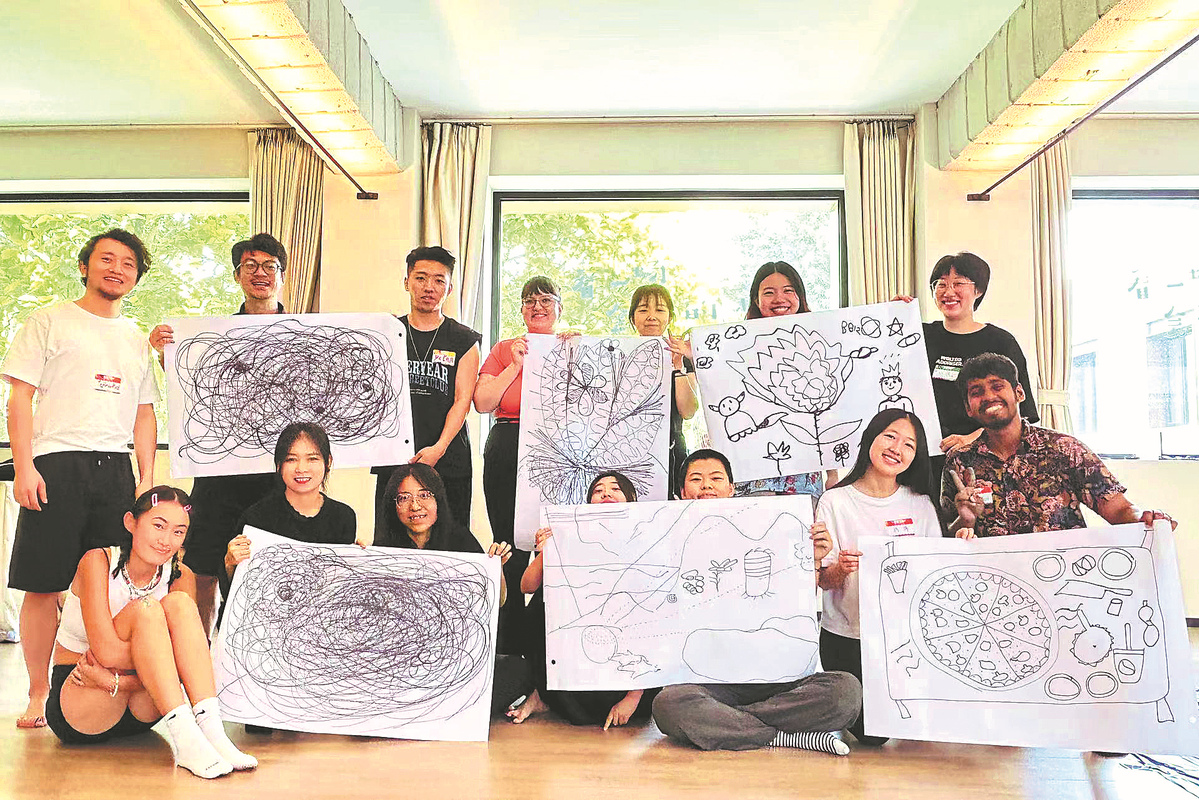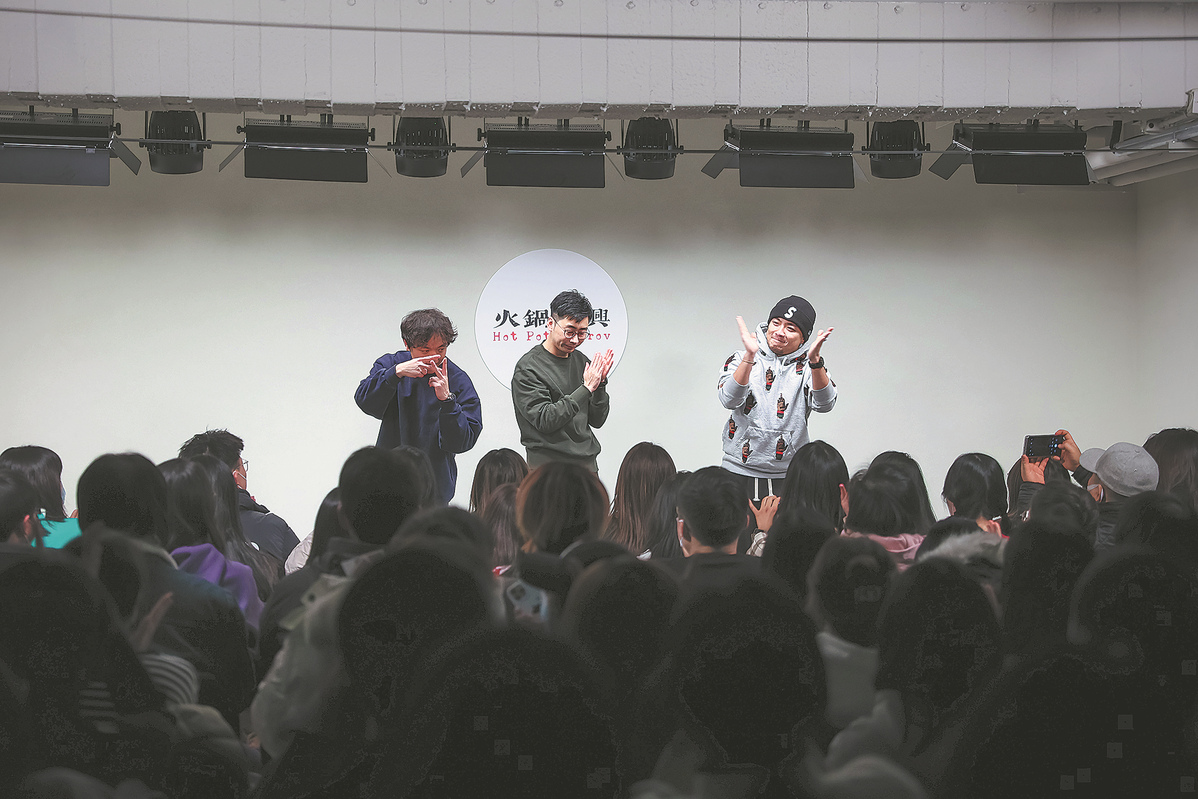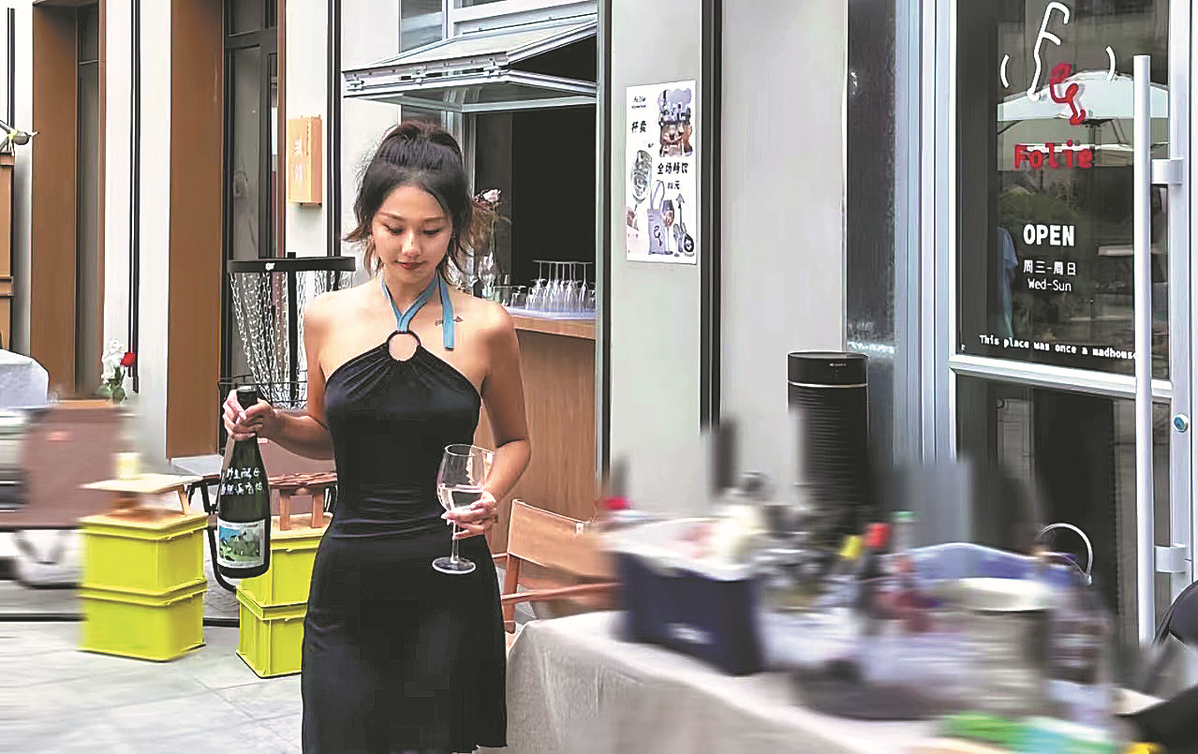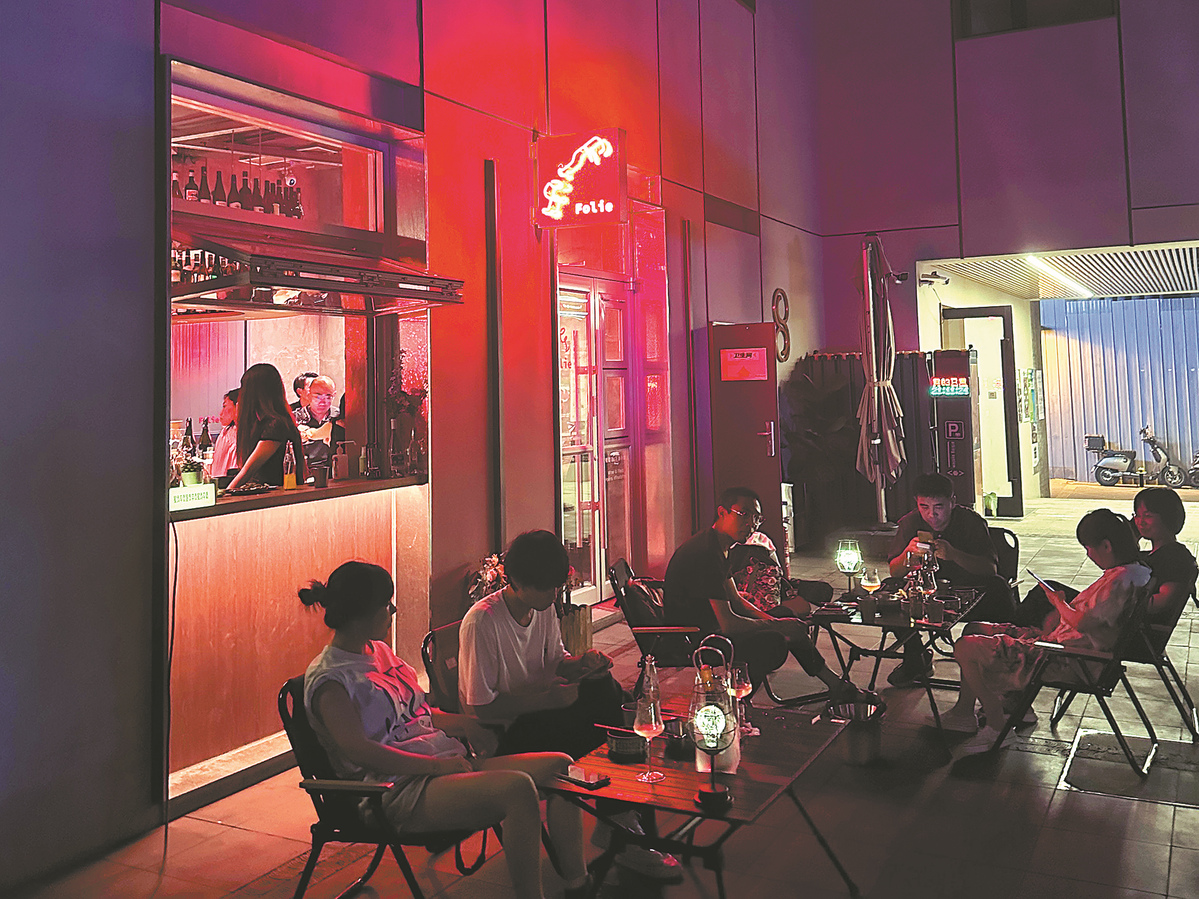Young people find their calling at cultural park

Artistic instruction is offered to the public at the park. [CHINA DAILY]
Hutong venue features modern ventures in traditional setting
Yin Yue is living her dream, as the small bar and restaurant she recently opened in a hutong, or alleyway, in Beijing is attracting customers from the Chinese capital and many other areas of the country.
"I named the restaurant Folie, the French word for madness," said Yin, who is in her 20s.
The bar at the eatery features Chinese and Western elements, such as the hutong setting and clips from the popular United States television series Friends.

Comedians perform at a small theater in the park. [CHINA DAILY]
Yin believes that this mixed cultural atmosphere caters to the tastes of young Chinese consumers.
"When I was looking for a suitable location for the business, I set my sights on an area deep in a hutong, and have made a point of highlighting hutong culture at the restaurant," she said.
The menu includes distinctive hutong snacks such as dumplings with mixed sesame and peanut butter, and fried pork intestines.
"I grew up eating these delicious snacks," said Yin, who was born and raised in Beijing.
To ensure the success of her business, Yin spent a year preparing to launch the restaurant after completing law studies at Renmin University of China last year.

Visitors watch an open-air art performance at Jintai 5Lmeet Cultural Industrial Park in Beijing's Dongcheng district. [Photo/China Daily]
She first went to wine-tasting events across the country to choose the right products for the restaurant, eventually acquiring a certificate as a senior wine taster.
Yin then worked on developing the menu with her chef, focusing on serving authentic classic Chinese cuisine.
To ensure everything went smoothly, she bought the sesame and peanut butter from a time-honored brand in Beijing. Other ingredients such as Chinese prickly ash and chili are purchased from a well-known production area in Chongqing.
As Yin was choosing the site for the restaurant earlier this year, the soon-to-open Jintai 5Lmeet Cultural Industrial Park began receiving visitors in the city's Dongcheng district in March. 5L stands for livable, linked, liberal, lively and landscaped, and Yin's restaurant is situated in the park.
Located north of the ancient Bell and Drum towers next to Beijing's Central Axis, the park covers about 4,000 square meters. It was built on the site where a group of technology experts from Shanghai used to work in the 1950s.
Li Yan, an administrative official at the park, said, "The site was affectionately called Shanghailou, or Shanghai building." It later served as office space for a municipal public institute.
"We preserved the main historical features of these office buildings when they were restructured and renovated," Li said.
A magnolia tree more than 100 years old stands in the courtyard at the site, offering welcome shade in summer. Trendy shops offering cultural creative items, artworks, coffee and catering services surround the courtyard.
"Cultural activities are often hosted here, such as art and book exhibitions," Li said.

Yin Yue, who runs a small bar and restaurant, has found her calling at the park. [Photo/China Daily]
The idea is for visitors to this old hutong area in present-day Beijing to observe the traditions of a bell being rung at dawn and a drum being beaten at dusk. This environment enticed Yin to set up her business in the park.
"As a local, I understand hutong and am deeply attracted by the culture of these old alleyways," she said.
After graduation, Yin moved into a hutong neighborhood near the new cultural park to embrace a traditional life.
"During one of my regular walks around the neighborhood, I found that businesses were being invited to the park," she said.
Yin was quick to notice that the park was primarily aimed at attracting young people in a hutong setting.
"I saw that shops in the area were obviously targeting young customers, which would help draw business to the entire neighborhood," she said.
"The courtyard environment is also cozy and highly suitable for eating and drinking in the open air."
Yin decided it was the perfect place for her to blend different cultures with Beijing traditions.

A class on restoring ancient books is held at the park. [Photo/China Daily]
"We showed clips from Friends and some classic films in the evenings at the courtyard this summer, serving guests traditional Chinese snacks with wine," she said.
Her business has won the hearts of numerous customers, with the restaurant usually fully booked during weekends.
"My customers usually visit the restaurant after work to enjoy food and chat with their friends," Yin said. "Most of them are young women, who can identify with the items I put up at the business."
Yin, who also acts as a lifestyle influencer on the social media platform Xiaohongshu, said many of her followers have visited the restaurant.
"Through my business, I want to attract more people who share my values and attitude to life," said Yin, who is planning to host regular wine tastings and bring more people with similar hobbies together.
"I want my business to be a place where guests can drink, dance to music, and cast off their daily worries about life," she said.

Visitors experience traditional woodblock printing at the park. [Photo/China Daily]
Chance accepted
Yin is just one of several young people who have found their calling at the cultural park.
For example, Cui Zhenshuo and one of his friends have opened a shop in the park that sells handmade paper.
When administrative officials from the park saw one of Cui's paper exhibitions in Beijing, they offered him the chance to open a business at the park, which Cui readily accepted.
"My business partner and I both grew up in Beijing, and we are into the hutong atmosphere," said Cui, who believes the traditional setting can help his small shop serve as "something of a museum" for visitors.
The business displays more than 500 types of paper that he and his team have collected from different parts of the country.
"We want more people to realize that our country has preserved a rich variety of paper, and many craftsmen are still committing themselves to this inheritance," said Cui, who is in his 30s.
"More importantly, this paper represents the diverse cultures of various regions and ethnicities across the nation," Cui said.
In particular, customers appreciate Dian paper from Yunnan province.
"It's made from the bark of local plants in the ethnic mountainous area, and the surface of this paper has a kind of glossiness, which looks extremely beautiful in sunlight," Cui said.
The shop also displays a type of paper from the Tibet autonomous region. "It is very sturdy and has excellent resilience," Cui said.
"When this paper is rolled up, it's difficult to flatten it. Even if you try hard to unfold it, it immediately springs back to its original position as soon as you release it," he added.
Cui attributes this characteristic to the plants in the high-altitude region.
Due to its durability, this paper is mainly used for printing local Buddhist scriptures and images of Buddha, Cui said.
In addition to displaying paper, the shop features paper lanterns of various shapes and sizes. They are made from huacao (flower and grass) paper that is mostly decorative and also used for wallpaper, umbrellas and bookmarks.
This type of paper, which retains the colors of the plants from which it is made, is among those that Cui and his partner found during their visits to production sites.
"The paper is basically produced in the depths of the mountains, which are home to the necessary raw materials and water sources," Cui said.
"The artisans we spoke to do not readily communicate with the outside world, so we feel the need to spread their craftsmanship and culture."
Although the internet has played a positive role in spreading Chinese culture, Cui thinks that to better experience these handmade products, visitors to his business need to touch the paper to get a real feel for it.
"We will try to display more handmade paper, and we hope that by appreciating our collection of paper, more people can understand its value and use it in daily life," Cui said.
"We will also strive to promote and preserve the memories and stories behind this paper to enable more people to appreciate China's rich traditional culture."

Yin's business is favored by young people who are drawn to hutong culture. [Photo/China Daily]
Major target
Cui is happy that most of his visitors are young people, who are his major target. Their appreciation of paper can go a long way to fulfilling his goal of preserving and carrying forward ancient crafts.
"The park is doing a great job in filling its space with cultural elements that match the tastes of young people," he said.
In addition to running his shop, Cui interacts with other business owners at the park.
"We are all pretty close in age, we speak the same language, and life here is full of vitality," he said.
Cui feels that as the park develops, it will attract more visitors.
The park also boasts a small theater that provides content creation space for young performers.
Fang Chao, who is in charge of the park's operation, said: "We have collaborated with a number of theater teams so that they can rent our venue at a discount for their rehearsals and performances. Courses at the theater will also be open to visitors and local residents."
Yin, the restaurant owner, has moved into an apartment offered by the park administration.
Whenever she has time, she sits on a bench in the courtyard at the park to relax.
"It's really nice taking in all the new cultural vibes in the hutong, reading, playing with my phone, or just zoning out," Yin said.
As she has come to better know the management team and other business owners, the park has become increasingly close to her heart.
"I'm really happy living and working in the same place, mixing business with pleasure," she said.
Photos
Related Stories
- Cradle of Civilization: Suoyang City Ruins
- Chinese vice president calls for enhanced exchanges, cooperation among civilizations
- Feature: Rural sports boost cultural inheritance in SW China
- Trending in China | Cuju: The ancient game that inspired soccer
- Excavation of Majiayuan site underway in Gansu
- High-tech radar to help in fight against relic crimes
- To break new ground of public communication, culture work in new era
- Int'l ceramic expo opens in China's "porcelain capital"
- Yangtze River basin intangible cultural heritage | Suzhou embroidery
- Marble columns back on display at their rightful home
Copyright © 2023 People's Daily Online. All Rights Reserved.









